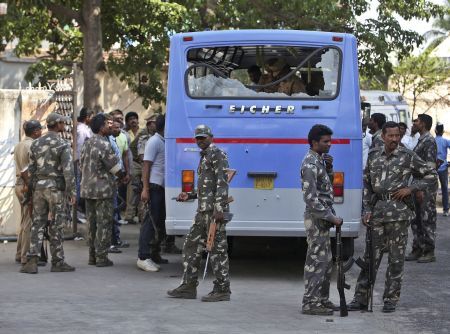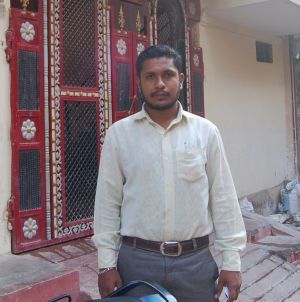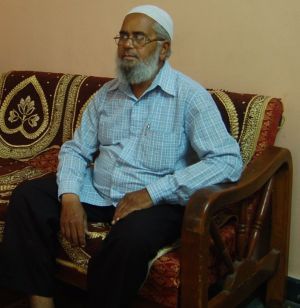
'This is not the handiwork of ordinary sub inspectors and constables.'
'If the police claim there was a scuffle between them and these five men, then how come none of the policemen were killed, or even hit by a bullet?'
Two families, related by blood and a tragedy, are devastated by the brutal murders of their young relatives in an alleged encounter by the Warangal police on April 7.
Syed Imtiyaz Ali, below, left, the brother of slain Syed Amjad Ali (28), and Mohammed Ahmed, bottom, left, the father of Vikaruddin Ahmed (34), maintain their loved ones were innocent and seek justice for them.
Prasanna D Zore/Rediff.com reports from Hyderabad.
"I bathed my elder brother and cousin before their funeral. Look at their photos: You can see their wounded lips, broken noses, holes in their bodies, proof of bullets fired from a close range that pierced through them; all evidence they were brutally tortured before being butchered."
"I will produce all these before the CBI (Central Bureau of Investigation) and if they investigate these killings honestly, the truth will definitely come out and we will get justice. But that is only if the CBI does its job honestly," says Syed Imtiyaz Ali, teary-eyed, as he flips through images of Syed Amjad Ali and Vikaruddin Ahmed after the post-mortem, with bullet and burn marks, clearly visible on their upper torsos, which the families insist are proof of police torture.
Vikaruddin's mother and Amjad's mother are sisters.
Imtiyaz, who believes the Telangana government has handed over the probe of the encounter to the CBI, says he will hand over these photographs, saved on his mobile phone, as material evidence of the "murders" to the CBI.
This correspondent spoke with him on the afternoon of April 13 and the announcement for the constitution of a Special Investigation Team was made on April 12. Imtiyaz was oblivious of the fact that the Telangana government had constituted an SIT to probe the 'encounters' at Alair in Nalgonda district. (Read: Telangana encounter: Father rejects SIT)
Imtiyaz, the second of three brothers, works in the neurology department at the Owaisi Hospital. He would often accompany his ailing father Syed Ashraf Ali to meet Amjad at the Warangal Central Jail where he had been lodged for almost five years along with Vikaruddin, Dr Mohammad Hanif Khan, Mohammed Izrar Khan and Mohammed Zakir.
"He (Amjad) would often tell me about police torture in jail in my father's absence," says Imtiyaz.
"My brother was acquitted in most cases, but two whose trial was underway. We were confident of his acquittal from those cases as well in the next three months," he adds.
"Had that happened, the police would have been exposed for falsely implicating these people in acts of terror and perhaps they decided to kill them," he says, when asked about the police's motive for staging the encounter.
All five men, allegedly Students Islamic Movement of India activists, were facing trial under various charges: Of killing policemen between December 2008 and May 2010; being a member of a radical outfit Darsgah Jehad O Shahadat; and being the founder of a fundamentalist organisation Tehreek Galba E Islam (Vikaruddin); of being a sympathiser and provider of logistics to Vikaruddin (Dr Hanif); and supplying pistol to Vikaruddin (Mohammadd Izrar Khan).
While the police escort involved in the encounter along the Warangal-Nalgonda border have reportedly maintained that the five undertrials attempted to snatch AK-56 rifles from policemen inside the van when Vikaruddin returned after answering nature's call, both Mohammad Ahmed and Imtiyaz vehemently contest these claims and believe they have pointed questions for the police for which there are no answers.
"If the police claim there was a scuffle between them and these five men when they tried snatching their guns and the other members of the police escort (those not involved in the scuffle) fired at them, then how come none of the policemen (involved in the scuffle) were killed, or even hit by a bullet? Isn't this absolutely unbelievable?" asks Ahmed angrily.
"Nobody seems to be questioning this important facet," the bereaved father points out.
"They say the encounter happened inside the police van. But there are not enough blood stains inside the van," adds Imtiyaz.
 "If you get to see the marks on their body after the post-mortem, then you would know they were brutally tortured before the encounter happened. I have those images which tell a tale. I will put those photos as evidence of police torture before the CBI," says Imtiyaz.
"If you get to see the marks on their body after the post-mortem, then you would know they were brutally tortured before the encounter happened. I have those images which tell a tale. I will put those photos as evidence of police torture before the CBI," says Imtiyaz.
"Do you think only one person, partly handcuffed, would knowingly make an audacious attempt to snatch the rifle from a policeman as the police claim was the reason for an encounter, even while aware of the fact that there were 16 more policemen escorting them?" he asks.
"The so-called urination and gun-snatching act by Vikaruddin is just a ploy to paint a picture of how dreaded my cousin was and justify the encounters," adds Imtiyaz.
Ahmed, who met his son a fortnight before he was gunned down in the April 7 encounter, says that his son did not say that his life was in danger from the police.
"When I met him last he did not mention any threat to his life from the police. But two years ago, when he was tortured mercilessly in the Warangal Central Jail, I sent a written complaint to the then chief justice of the Hyderabad high court along with copies to the state human rights commission. The high court had then ordered the director general of police, prisons, to investigate the torture."
"Based on further torture Vikar had submitted a sworn affidavit to the judge hearing his case that his life was under threat from the escort that would take him to various courts for hearings," Ahmed says.
"If you see the bullet marks you would notice that not a single bullet was lodged inside their bodies. All the bullets just went through their body. This is clear evidence that they were shot at from close range," he adds.
"My brother was brought back from Gujarat on either March 8 or 9," says Imtiyaz. "I met him on March 10. While he would never let us know that his life was under threat from the police lest we got stressed, he would often tell the court that they could get killed in fake encounters."
Both families question the timing when the five men were taken from Warangal jail for the hearing at the sessions court in Hyderabad.
The distance between Warangal and Hyderabad is about 150 km. Ahmed and Imtiyaz say the police could have covered this distance in three hours.
"What was the need for the police to leave Warangal at 8.30 am when the case was at 1.30 pm?" asks Ahmed.
The motive for the 'encounter', says Ahmed confidently, could be political. What exactly it is, he says, is beyond his understanding. He alleges that higher authorities are involved too. "Ordinary SI aur constables yeh karnama nahi kar sakte (This is not the handiwork of ordinary sub inspectors and constables)," he says.
"Unko kya benefit milne wala hai, yeh toh Allah janta hai (What benefit they will derive from these murders is best known to Allah)," Ahmed says.
"My brother had no case registered against him in Warangal. Yet they were sent to a jail there. Even in court Amjadbhai had pleaded to shift him to a prison in Hyderabad," he says.
On April 6, Vikaruddin petitioned the court for a transfer from Warangal jail to a Hyderabad jail. The hearing was scheduled for April 7, at 1.30 pm. "They were bumped off (uda diye unho) before they could reach the court," says Vikaruddin's father.
 "Agar kisi ka jawaan beta aise bemaut maar diya jaye toh who maa-baap hi jante hai un par kya guzarti hai (Only those parents whose young son has been shot dead so brutally can understand our pain and suffering)," says Ahmed.
"Agar kisi ka jawaan beta aise bemaut maar diya jaye toh who maa-baap hi jante hai un par kya guzarti hai (Only those parents whose young son has been shot dead so brutally can understand our pain and suffering)," says Ahmed.
"Whatever a person's crime," he says, "let the courts decide if someone is guilty of a crime or not. The police should not deliver justice in such a cruel manner."
"We set an example to the world by what happened in Mumbai. He (Ajmal Kasab, the Pakistani terrorist captured alive after the 26/11 terror attacks) was sentenced to death by the courts. He was not killed by the police. But these people (the police and politicians) here (in Telangana) want to set the Gujarat example (he mentions Ishrat Jahan) of killing people in fake encounters."
"We don't need any help from politicians," says Imtiyaz, "for they will politicise the issue for their benefit. We want justice, not politics. We want exemplary punishment for all those guilty of these killings."
"The bullets were fired by the police," he adds, "but the brain behind the act belongs to somebody else."
Photographs of Syed Imtiyaz Ali and Mohammed Ahmed: Prasanna D Zore/Rediff.com










